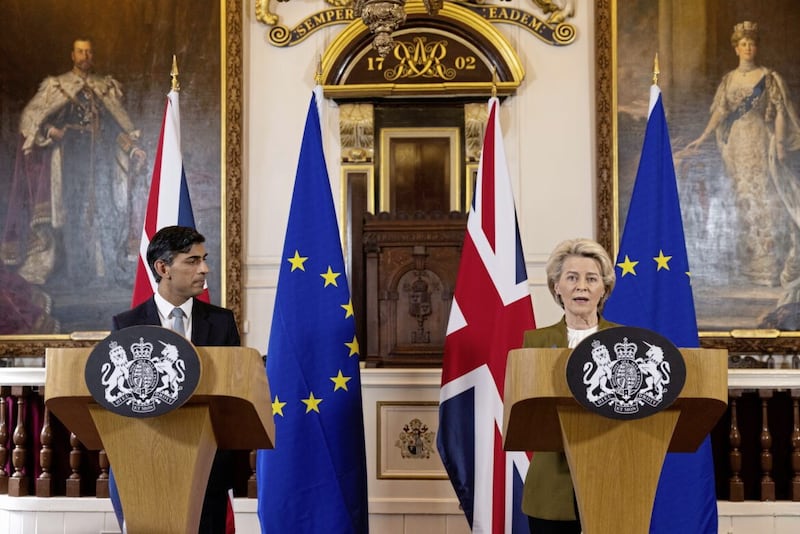The first thing to say is that the DUP did, against expectations, chalk up a number of successes in terms of persuading the UK government and EU commission to agree mutual concessions re the working of the NI Protocol.
For a couple of years the party’s opponents made common cause in saying that change wasn’t possible and that ‘the EU was never going to shift just to suit the DUP’.
Well, it did. Partly because Rishi Sunak, from the moment he became prime minister, developed a much more cooperative relationship with Ursula von der Leyen. He wanted Brexit in the rear-view mirror; but crucially, he wanted success as a way of building new bridges with the EU. Which, of course, made it much easier for the EU to be open in its willingness to be flexible.
Sunak was also able to convince the EU that flexibility was essential if the DUP was to be persuaded to return to the NI Executive and reboot the assembly.
The DUP’s boycott allowed him to highlight the scale and nature of unionist concerns about the protocol (what I have described as the ‘granny flat dilemma’) and how the continuation of the impasse threatened a key element of the Good Friday Agreement. The EU seems to have accepted the argument and agreed to help as best it could.
But will it be enough? Will it meet the demands set out by the DUP in its seven tests? We probably won’t know the answer to that question for at least a few days, maybe longer.
The continuing input from the ECJ, the necessity for some EU laws, the dumping of the NI Protocol Bill and concerns about the precise nature of NI’s position within the UK will unsettle elements of unionism and loyalism, especially those best described as purists.

Ian Paisley has already said that the Windsor Framework neither “cuts the mustard” nor provides a basis for the DUP to return to government.
Whether he consulted with his party leader first is not clear (although I would doubt it), but he is parliamentary chair of the Centre For The Union—which is purist in tooth and claw—and they may take their steer from him. And worth noting, too, that Jamie Bryson is the centre’s director of policy for NI. I may be writing too early, but I would be surprised if Jim Allister and the LCC didn’t reach a conclusion fairly similar to Paisley’s.
The UUP issued a statement promising to reflect on the Windsor Framework and ‘take into consideration the concerns that we have raised and whether it truly provides long-lasting solutions’.
Elements of the party’s grassroots – who, weeks away from the council elections, will not want to drift too far to the left of the DUP – will be cautious about an over-warm response from Doug Beattie; but other elements will be concerned that too hard a response will only shift more votes to Alliance.
Jeffrey Donaldson has huge problems. He is a devolutionist to his fingertips, as are many of the party’s key players. But he knows that relentless pressure, particularly from the TUV (up another couple of points in the latest LucidTalk polls) will rattle the nerves of a membership which is dreading the campaign trail responses they’ll get on doorsteps in a few weeks.
Many of them have known only electoral success since 2003 and haven’t fully recovered from losing tens of thousands of votes to the TUV last May, as well as the status of largest party. They fear another hammering.
So, Donaldson’s choice is a simple, if brutal one. Reject a deal which a UK parliament is likely to endorse with a massive majority, leaving the party weak and friendless at the centre of power. Or face down his internal and external opponents and try and persuade a majority of unionist voters that, while not perfect, the Windsor Framework is much better than most people imagined even as recently as the start of January.
Perhaps the most crucial debate we’ll hear over the next couple of weeks will be between the competing factions of unionism.







